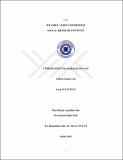Please use this identifier to cite or link to this item:
http://hdl.handle.net/11547/1387| Title: | TÜRK HUKUKUNDA BABALIK DAVASI |
| Authors: | Suleyman, Sıraj |
| Keywords: | Babalık Davası Soybağı Çocuğun Korunması Babalığın İspatı Çocuğun Hakları Paternity Case Paternity Child Protection Proof of Fatherhood Child’s Rights |
| Issue Date: | Feb-2018 |
| Publisher: | İSTANBUL AYDIN ÜNİVERSİTESİ SOSYAL BİLİMLER ENSTİTÜSÜ |
| Abstract: | ÖZET Bu tez çalışmamızın amacı, 22.11.2001 kabul tarihli ve 4721 sayılı Türk Medeni Kanunu başta olmak üzere, gereken hallerde 743 sayılı eski Türk Kanuni Medenisindeki durumu da karşılaştırmalı olarak ele alınıp, aynı zamanda 6098 sayılı Türk Borçlar Kanunu ve diğer muhtelif kanun ve yönetmeliklerden yararlanıp, babalık davasını incelemeye çalışmaktır. Babalık davasının açılmasındaki amaç, evlilik dışı bir ilişkiden dünyaya gelmiş olan ve kendi rızası ile çocuğu tanımak istemeyen babanın, çocuğu ile arasındaki soybağı ilişkisinin mahkeme kararıyla kurulmasını sağlamaktır. 4721 sayılı Türk Medeni Kanunumuz, 2002 yılına kadar yürürlükte kalan 743 sayılı Eski Medeni Kanunumuzun soybağına ilişkin olan hükümlerinde önemli sayılabilecek değişiklikler yapmıştır. Babalık davası da bu değişikliklerden önemli derecede etkilenen kurumlardandır. Yapılan bu değişikliklerin ana nedeni, son zamanlarda gerek uluslararası gerekse ulusal hukuklarda çocuk haklarının gittikçe önem kazanması ve çocuk yararının üstünlüğü ilkesinin giderek evrensel bir hukuk ilkesi haline gelmesinden kaynaklanmaktadır. Babalık davası esnasında ortaya çıkan en önemli sorun olarak addedebileceğimiz babalığın ispatı, tıp biliminin gelişmesinden dolayı artık sorun olmaktan çıkmışve günümüzde gerek kan incelemesi yöntemleri, gerek antropolojik ve kalıtımsal inceleme yöntemi, gerekse DNA testleri ile davalının çocuğun babası olup olmadığını kesin olarak tespit edilmeye başlanmıştır. DNA testinin babalık davasında en önemli delil haline gelmesi, yapılacak test için kan ve doku vermekten kaçınan davalı ve üçüncü kişilere karşı nasıl davranılacağı hususunda kanun koyucuyu düzenleme yapmaya itmiştir. Çalışmamızda, babalık davası ile ilgili hukukumuzda yer alan düzenlemeler, doktrin açıklamaları ve Yargıtay’ın bu konudaki içtihatları doğrultusunda incelenmiştir. ABSTRACT The aim of this thesis is to establish the Turkish Civil Code dated 22.11.2001 and numbered 4721, where necessary the situation in the former Turkish Civil Code numbered 743 is taken into consideration comparatively and at the same time it is tried to examine the paternity case by taking advantage of Turkish Law of Obligations No. 6098 and various other laws and regulations. The purpose of opening the paternity case is to ensure that the parental relationship between the father and the child, who has come to the world from an unmarried relationship and does not want to know the child with his/her own consent. The Turkish Civil Code numbered 4721 has made amendments that can be considered important in the provisions concerning the genealogy of the Old Civil Code numbered 743 which was in force until 2002.The paternity case is also an institution that has been affected significantly from these changes.The main reason for these changes comes from the fact that the rights of children have become increasingly important both internationally and nationally, and the principle of superiority of children has become an increasingly universal legal principle. Evidence of the father, who is considered the most important problem that arises during the paternity case, it is no longer a problem because of the development of medical science, and today, it has begun to be precisely determined whether the father of the defendant is the father of the child by means of blood examination methods, anthropological and hereditary examination methods and DNA tests.The DNA test becoming the most important proof, makes the legislator to systematize the actions against the plaintiff and the third parties who refuses to give blood and tissue for a determined test The aim of our study is analysing the arrangements in our national law in light of explanations in jurisprudence and interpretation of Supreme Court of Appeals. |
| URI: | http://hdl.handle.net/11547/1387 |
| Appears in Collections: | Tezler -- Thesis |
Files in This Item:
| File | Description | Size | Format | |
|---|---|---|---|---|
| TÜRK HUKUKUNDA BABALIK DAVASI.pdf | Yüksek Lisans Tez Dosyası | 1.1 MB | Adobe PDF |  View/Open |
Items in DSpace are protected by copyright, with all rights reserved, unless otherwise indicated.
